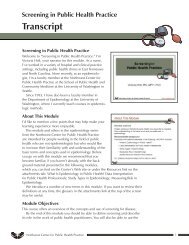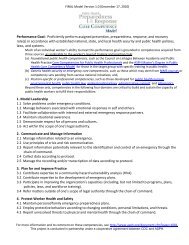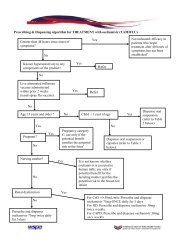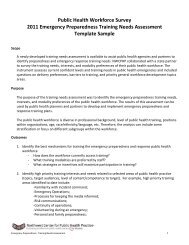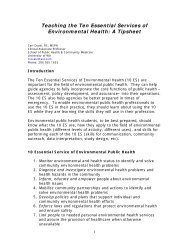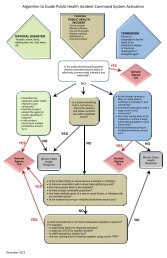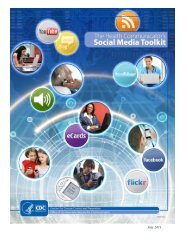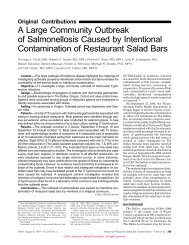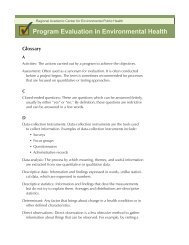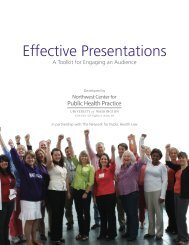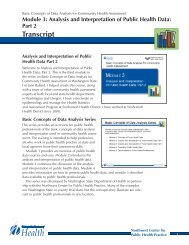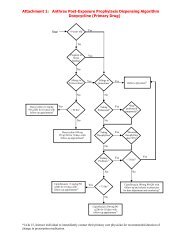Effective Adult Learning - Northwest Center for Public Health Practice
Effective Adult Learning - Northwest Center for Public Health Practice
Effective Adult Learning - Northwest Center for Public Health Practice
You also want an ePaper? Increase the reach of your titles
YUMPU automatically turns print PDFs into web optimized ePapers that Google loves.
divided into six levels or hierarchies.<br />
Level 1: KNOWLEDGE<br />
This level involves recalling definitions and specifics.<br />
Learners should remember an idea, phenomenon, or a fact.<br />
Examples: 1) write a <strong>for</strong>mula, 2) define a term.<br />
Level 2: COMPREHENSION<br />
This level involves translating and associating. Learners<br />
should be able to communicate an idea in a new or different<br />
<strong>for</strong>m or see relationships among things or events. Examples:<br />
1) describe three distinguishing features of a specific system,<br />
2) explain the rationale <strong>for</strong> using a particular tool.<br />
Level 3: APPLICATION<br />
This level involves using abstract concepts in specific<br />
applications. The abstractions may be in the <strong>for</strong>m of<br />
general ideas, rules or procedures, or generalized methods.<br />
Examples: 1) when given a scenario, submit the most<br />
suitable alternative taking into account all factors, 2) apply a<br />
particular technique to maintain safety.<br />
Level 4: ANALYSIS<br />
This level involves examining elements, relationships and<br />
organizational principles. This involves understanding<br />
organizational structures. Examples: 1) when given a set of<br />
data, ascertain whether they are internally consistent and can<br />
be reported, 2) when given specific in<strong>for</strong>mation, analyze the<br />
results to identify an unanticipated outcome.<br />
Verbs to Avoid<br />
The following verbs<br />
cannot be measured or<br />
are redundant. They<br />
should be avoided<br />
when writing learning<br />
objectives.<br />
• Able to<br />
• Shows interest in<br />
• Has appreciation <strong>for</strong><br />
• Knows<br />
• Has awareness of<br />
• Has knowledge of<br />
• Is capable of<br />
• Learns<br />
• Comprehends<br />
• Memorizes<br />
• Is conscious of<br />
• Understands<br />
• Is familiar with<br />
• Will be able to<br />
Level 5: SYNTHESIS<br />
This level involves generating a set of abstract relations<br />
(to hypothesize), creating a plan, or a set of operations.<br />
Examples: 1) prepare appropriate financial statements<br />
<strong>for</strong> decision-making, 2) propose a structure to optimize<br />
efficiency and effectiveness.<br />
Level 6: EVALUATION<br />
This level involves using internal standards and external<br />
criteria to bring about in<strong>for</strong>med decisions. Examples: 1)<br />
evaluate and select an automated system in view of costs,<br />
personnel, productivity and space, 2) validate all of the data<br />
received in a specific situation.<br />
www.nwcphp.org <strong>Effective</strong> <strong>Adult</strong> <strong>Learning</strong>: A Toolkit <strong>for</strong> Teaching <strong>Adult</strong>s | 19



